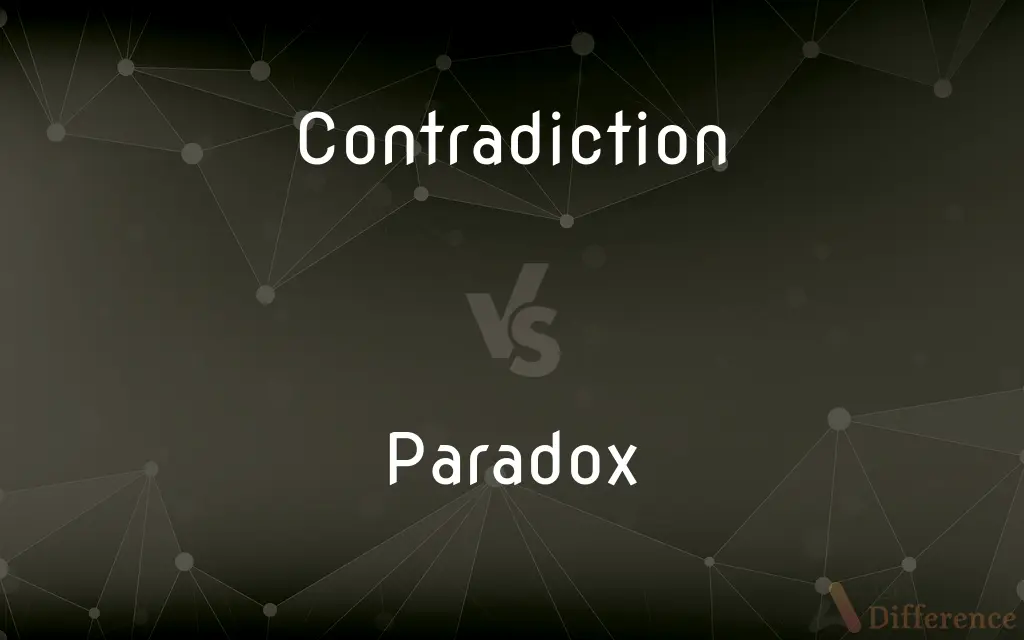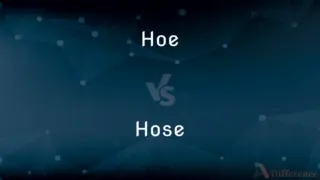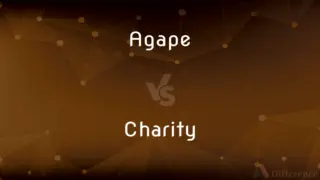Contradiction vs. Paradox — What's the Difference?
By Maham Liaqat & Fiza Rafique — Updated on March 10, 2024
A contradiction involves a direct opposition between two statements where both cannot be true, highlighting logical inconsistency, while a paradox presents a seemingly absurd statement that, upon reflection, may reveal a deeper truth or insight.

Difference Between Contradiction and Paradox
Table of Contents
ADVERTISEMENT
Key Differences
Contradiction is a fundamental concept in logic and philosophy, signifying a situation where two statements are in direct opposition to each other, making it impossible for both to be true at the same time. Paradox, on the other hand, is more nuanced and is often used in literature, philosophy, and everyday discourse to express statements that appear absurd or self-contradictory at first glance but may contain an underlying truth when analyzed more deeply.
For example, saying "It is raining" and "It is not raining at the same place and time" represents a contradiction because both statements cannot coexist; one negates the other, leading to a logical inconsistency. Paradoxes challenge our understanding and invite us to look beyond the apparent contradiction to find coherence. A classic example is the statement "This statement is false." If the statement is true, it must be false, and vice versa, creating a paradox that defies straightforward logical classification.
While contradictions are generally seen as flaws in arguments or reasoning, paradoxes can be thought-provoking and are used to stimulate critical thinking, often leading to new insights or perspectives. Contradictions demand resolution, as they indicate a fault in reasoning, whereas paradoxes can remain unresolved, serving as points of reflection and deeper understanding.
In literature and rhetoric, contradictions are often avoided to maintain consistency and clarity, while paradoxes are embraced for their poetic and philosophical value, offering depth and complexity to discussions and narratives. They enrich the text by adding layers of meaning and encouraging readers to engage more deeply with the material.
Both contradiction and paradox play significant roles in shaping our understanding of complex issues and ideas. Recognizing the difference between them is crucial in various fields, from logic and philosophy to literature and everyday reasoning, allowing us to navigate and interpret the complexities of language and thought more effectively.
ADVERTISEMENT
Comparison Chart
Definition
A direct opposition between two statements where both cannot be true.
A seemingly absurd or self-contradictory statement that may reveal a deeper truth.
Nature
Logical inconsistency.
Thought-provoking and insightful.
Purpose
To highlight errors in reasoning or argument.
To stimulate reflection and deeper understanding.
Resolution
Requires resolution to correct inconsistency.
May remain unresolved, serving as a point of reflection.
Usage
Avoided in logical and coherent arguments.
Used for rhetorical, literary, and philosophical effect.
Compare with Definitions
Contradiction
Direct opposition in statements,
I am lying right now cannot be simultaneously true and false.
Paradox
Enhancing narrative depth,
Orwell's War is peace. Freedom is slavery. Ignorance is strength.
Contradiction
Highlighting opposing premises,
Zeno's paradoxes that challenge motion's concept.
Paradox
Provoking reevaluation of concepts,
Schrödinger's Cat in quantum mechanics.
Contradiction
Inconsistencies in reasoning,
Claiming someone is the best and worst player simultaneously.
Paradox
Reflecting on past events,
The Great Silence paradox regarding the lack of extraterrestrial contact.
Contradiction
Contradictory language use,
Saying I always lie creates a contradiction.
Paradox
Stimulating thought,
The only constant is change.
Contradiction
Incompatible equations or statements,
Proving a false assumption in mathematics by deriving a contradiction.
Paradox
Engaging audiences,
Less is more in minimalist design philosophy.
Contradiction
In traditional logic, a contradiction occurs when a proposition conflicts either with itself or established fact. It is often used as a tool to detect disingenuous beliefs and bias.
Paradox
A paradox is a logically self-contradictory statement or a statement that runs contrary to one's expectation. It is a statement that, despite apparently valid reasoning from true premises, leads to a seemingly self-contradictory or a logically unacceptable conclusion.
Contradiction
The act or an instance of contradicting
The witness's contradiction of other testimony.
Paradox
A seemingly absurd or contradictory statement or proposition which when investigated may prove to be well founded or true
The uncertainty principle leads to all sorts of paradoxes, like the particles being in two places at once
Contradiction
The state of being contradicted
A supervisor who cannot tolerate contradiction from any subordinate.
Paradox
A statement that seems to contradict itself but may nonetheless be true
The paradox that standing is more tiring than walking.
Contradiction
An inconsistency or discrepancy
"Surprisingly few people saw a contradiction between freedom for whites and bondage for slaves" (Adam Hochschild).
Paradox
A person, thing, or situation that exhibits inexplicable or contradictory aspects
"The silence of midnight, to speak truly, though apparently a paradox, rung in my ears" (Mary Shelley).
Contradiction
Inconsistency; discrepancy
Practices that are in contradiction to human rights.
Paradox
A statement that is self-contradictory or logically untenable, though based on a valid deduction from acceptable premises.
Contradiction
One that contains elements that oppose or conflict with one another
The phrase "an unmarried husband" is a contradiction in terms.
Paradox
An apparently self-contradictory statement, which can only be true if it is false, and vice versa.
"This sentence is false" is a paradox.
Contradiction
The act of contradicting.
His contradiction of the proposal was very interesting.
Paradox
A counterintuitive conclusion or outcome.
It is an interesting paradox that drinking a lot of water can often make you feel thirsty.
Contradiction
(countable) A statement that contradicts itself, i.e., a statement that claims that the same thing is true and that it is false at the same time and in the same senses of the terms.
There is a contradiction in Clarence Page's statement that a woman should have the right to choose and decide for herself whether to have an abortion and at the same time she should not have that right.
There is a contradiction in what you say: she can't be both married and single.
Paradox
A claim that two apparently contradictory ideas are true.
Not having a fashion is a fashion; that's a paradox.
Contradiction
(countable) A logical inconsistency among two or more elements or propositions.
Marx believed that the contradictions of capitalism would lead to socialism.
Paradox
A thing involving contradictory yet interrelated elements that exist simultaneously and persist over time.
Contradiction
A proposition that is false for all values of its propositional variables or Boolean atoms.
Paradox
A person or thing having contradictory properties.
He is a paradox; you would not expect him in that political party.
Contradiction
An assertion of the contrary to what has been said or affirmed; denial of the truth of a statement or assertion; contrary declaration; gainsaying.
His fair demandsShall be accomplished without contradiction.
Paradox
An unanswerable question or difficult puzzle, particularly one which leads to a deeper truth.
Contradiction
Opposition between two conflicting forces or ideas
Paradox
(obsolete) A statement which is difficult to believe, or which goes against general belief.
Contradiction
(logic) a statement that is necessarily false;
The statement `he is brave and he is not brave' is a contradiction
Paradox
(uncountable) The use of counterintuitive or contradictory statements (paradoxes) in speech or writing.
Contradiction
The speech act of contradicting someone;
He spoke as if he thought his claims were immune to contradiction
Paradox
A state in which one is logically compelled to contradict oneself.
Paradox
The practice of giving instructions that are opposed to the therapist's actual intent, with the intention that the client will disobey or be unable to obey.
Paradox
A tenet or proposition contrary to received opinion; an assertion or sentiment seemingly contradictory, or opposed to common sense; that which in appearance or terms is absurd, but yet may be true in fact.
A gloss there is to color that paradox, and make it appear in show not to be altogether unreasonable.
This was sometime a paradox, but now the time gives it proof.
Paradox
(logic) a self-contradiction;
`I always lie' is a paradox because if it is true it must be false
Common Curiosities
Can a paradox be true?
Yes, paradoxes can express deeper truths through their seemingly contradictory nature, inviting deeper thought and analysis.
What is a contradiction?
A contradiction refers to a situation where two statements are in direct opposition, making it impossible for both to be true simultaneously.
What is a paradox?
A paradox is a statement that appears self-contradictory or absurd but may hold a deeper truth upon closer examination.
How should one approach paradoxes in texts?
Paradoxes in texts should be approached with an open mind, considering the broader context and possible underlying meanings.
How do contradictions and paradoxes differ?
Contradictions indicate logical inconsistencies needing resolution, while paradoxes pose thought-provoking challenges that may not require resolution.
Can a statement be both a contradiction and a paradox?
Some statements can embody both qualities, appearing as contradictions while also serving as paradoxes that offer deeper reflections.
Is every contradiction a paradox?
No, not every contradiction is a paradox; contradictions are logical inconsistencies, while paradoxes are seemingly contradictory statements with potential hidden truths.
Why are contradictions problematic in arguments?
Contradictions undermine the coherence and validity of arguments, indicating flaws in reasoning that must be addressed.
Can paradoxes exist in science?
Yes, paradoxes exist in science and often indicate areas where existing theories may be incomplete or require reevaluation.
Can a paradox be resolved?
Some paradoxes can be resolved or understood through deeper analysis, while others remain as provocations to conventional thinking.
How do contradictions affect logical reasoning?
Contradictions disrupt logical reasoning by presenting mutually exclusive statements that cannot both be true, necessitating a correction in reasoning.
How do paradoxes and contradictions influence critical thinking?
They challenge individuals to scrutinize assumptions, analyze logic, and explore beyond surface-level interpretations, thereby enhancing critical thinking skills.
How do paradoxes contribute to literature and philosophy?
Paradoxes enrich literature and philosophy by adding depth, stimulating reflection, and challenging conventional wisdom.
Why do people use paradoxes?
People use paradoxes to provoke thought, illustrate complex ideas, and challenge the listener or reader to consider deeper insights.
Are contradictions always negative?
While contradictions are often seen as flaws in reasoning, they can also serve as useful tools in identifying and correcting errors in arguments.
Share Your Discovery

Previous Comparison
Hoe vs. Hose
Next Comparison
Agape vs. CharityAuthor Spotlight
Written by
Maham LiaqatCo-written by
Fiza RafiqueFiza Rafique is a skilled content writer at AskDifference.com, where she meticulously refines and enhances written pieces. Drawing from her vast editorial expertise, Fiza ensures clarity, accuracy, and precision in every article. Passionate about language, she continually seeks to elevate the quality of content for readers worldwide.
















































